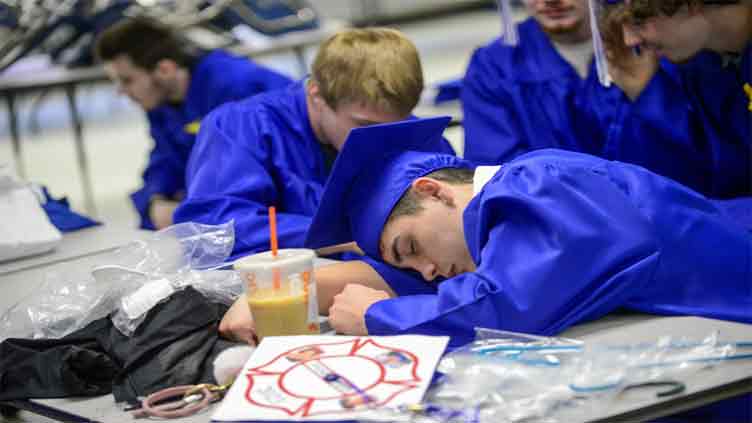NEW YORK: If you’re feeling sleepy or bored as you read this — and wishing you could open your eyes again — you’re not alone. Most Americans say they would be better off if they got more sleep, according to a new poll.
But in the US, hustling and self-loading habits are everywhere, both in the country’s early days and in today’s technology and work-time environment. Getting enough sleep can be like a dream.
A Gallup poll found that 57 percent of Americans said they would be better off if they got more sleep, while only 42 percent said they got enough. This is Gallup’s first poll since 2001; When Americans were last asked in 2013, the opposite was true — 56 percent said they got enough sleep and 43 percent said they didn’t.
Young women under 50 are especially likely to report not getting enough rest.
The survey also asked respondents to report how many hours of sleep they got each night: Only 26pc said they got eight hours or more, which is the amount recommended by experts for health and mental health. More than half, 53pc, reported taking six to seven hours. 20pc said they got five hours or less, a jump from 14pc who reported getting less sleep in 2013.
(And to make you even more tired, in 1942, most Americans slept more. 59% said they slept eight hours or more, and 33% said they slept six to seven hours. What’s that?)
The poll doesn’t address why Americans aren’t getting enough sleep, and since Gallup last asked the question in 2013, no data has shown a disparate effect in the past four years with the pandemic.
But Sarah Fioroni, Gallup’s senior research fellow, points out that in the past decade, there has been a shift toward more Americans thinking they could sleep more, especially with an increase in the number of people who say they get five hours or less.
“That five-hour-or-less category … was completely unheard of in 1942,” Fioroni said. “Nobody said they slept five hours or less.”
“In modern American life, there is no mention of how sleep is unnecessary – it is a period of inactivity where nothing really happens and time that could be better spent,” says Joseph Dzierzewski. Vice President of Research and Science at the National Sleep Foundation.
Recently, he said, the importance of sleep for physical, mental and emotional health has become more popular among the population.
There is still a long way to go. For some Americans, like Justine Brougal, 31, who is planning independent activities with two young children, there just aren’t enough hours in the day. So, while she understands that sleep is important, it often falls below other priorities, such as her four-month-old son or her three-year-old daughter, who often wakes up at night.
“I really appreciate being able to spend time with my kids,” Brougal said. “Part of the benefit of freelancing is that I get a more flexible schedule, but often at the expense of my own care.”
So why are we always awake? One of the reasons for America’s insomnia is the longstanding cultural emphasis on work and productivity.
Some contexts are older than the documented shifts in elections. Claude Fisher, a professor of sociology at the University of California, Berkeley, said it included Protestants from European countries that colonized the country. Their belief system includes the idea that hard work and being rewarded with success is evidence of divine grace.
Jennifer Sherman sees it in action. The Washington State University sociology professor said in his years of research in rural America that a common theme among the people he interviewed was a strong work ethic. This applies not only to paid work but also to unpaid work such as house cleaning.
Permeating the mythology of American culture is the idea of ”being uniquely responsible for creating our own destiny.” “It shows that if you spend a lot of time … you are responsible for your failure.”
“On the other hand, tea money has a lot of hate for people who are perceived as lazy,” he said.







